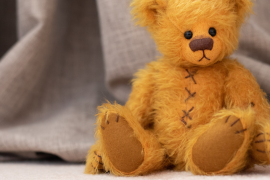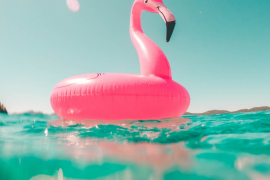THEY HAVE ERASED ME FROM THE PHOTOGRAPH BY NOW. The one they sent to the papers with all of us sat outside the refectory. They do that, you know. The moment they lose one of us, they set a team to work scrubbing us out. They never get it right—there’s always a strange smudge or warp to the picture. To most the imperfections are just glitches. But to us they are our friends: Sacha, Grishna, Alina—all consigned to the blurry anonymity of erasure. And I am next.
What a marvel I am. The third man in space—a pioneer of the cosmonaut program—a moment in history—and here I am, waiting to die. No one will ever know I existed. They will tell you, if you have the balls to ask, that we are neck-and-neck with the Americans. But it’s a lie. It’s party-talk. We’re ahead; far ahead. The Americans are concerned with safety, but here we are concerned with sacrifice. So we send people up, every few months, we just haven’t worked out how to get them—to get us—back.
I have been alone before. In fact, prior to joining my comrade cosmonauts, I had few friends. But nothing compares to circling the earth, two-hundred miles up, with no way home. That is being alone. And it is an experience entirely unique to me—the only people who know how I feel are dead.
I am too, I suppose. That I am still breathing is a technicality; mathematically I am just another dead spaceman. Even if I survived the ten days until my orbit decayed, what would I be if I returned after all that time in a dead and frozen craft with no human contact? I think about how, in some places, the hull is only millimetres thick, and wonder if I could put a hole through it with my fist. But there’s no need. I am already venting, and if I wished to hasten that there is a handle beside me which would expose my cockpit to the complete absence of air pressure outside.
At least it would be quick.
You don’t volunteer to sit on top of a rocket bound for space if you are afraid to die. I just don’t want them to erase me, just like that. I don’t want to be a strange shade in someone’s sleeve. Not like Grishna. Leave it a while, let people remember. There are better ways to memorialise a cosmonaut than scrubbing them from old photographs and burying a medal in an unmarked grave.
I’ve spent hours flicking the radio switch on and off like a petulant child. All I receive is a hiss of static, like a clutch of snakes have hitched a ride in my instrument panel. What do you even call a group of snakes, anyway? A herd? A slither? A rope?
Perhaps it’s for the best I can’t speak to the ground. I was there when Alina fell to earth and somehow hearing her last moments was worse than losing her in silence. She made it through the ten days, but something went wrong in re-entry.
“I feel hot,” she said through the static. “I can see flame. I’m going to crash!”
She was weeping as she screamed and we wept too. All but Korolev, he just turned away as we tried to raise her again and again. Yuri thinks Korolev is cold. He says he is like an undertaker who cares only for the coffin, not for the corpse he seals inside. I think he is just stoic—maybe he weeps when none of us are watching, like a father hiding his tragedy from his children.
The radio taunted us with one last message, wreathed in interference: “Am I going to crash? Please tell me.”
Maybe I loved her. At least so much as people risking their lives daily can love anything. I turn on the snakes again to drown that thought out. I don’t think I will wait. Whether I go now or in ten days, it will not matter. No parade for me, no Hero of the Soviet Union—just long silence until the breathing stops.
The little porthole looks out into space, showing star after boring star. They track by in brilliant arsenic white. As exciting as spaceflight is on paper, once you’ve seen one star you’ve really seen them all. I wonder if, somewhere out there, someone is looking back at me with the same weary frustration.
I try to find the earth in the window. I crane my neck to broaden the view and catch a hint of blue, interrupted by a flash of dull sunlight reflected back at me. There is my radio transmitter staring right at me.
“It shouldn’t do that.”
Nobody responds.
“It shouldn’t do that!” I repeat, a smile across my face.
There is nothing wrong with the circuitry. I have been fiddling with it for hours like I was playing with my food for nothing. No – the transmitter is misaligned.
But how?
No – no time for deduction, the how doesn’t matter.
But how to realign it? Perhaps I can catch a signal—maybe I am not alone—I could even send a message.
I can see the oxygen gauge gurgle to life as my heart begins to race. All my knowledge, all those carefully rehearsed procedures are lost to the excitement. I have no propulsion, so how to manoeuvre? Can I wait for the craft to align naturally in its gentle roll? That could take days—especially as I don’t know how large the vent is—I might not have enough air. Air. That’s it. I’m already dead, I don’t need it all. If I vent, just a little, I can push the capsule into a faster spin. Slow enough to keep alignment for a while once I find it, fast enough so I don’t suffocate before I see home. My notebook is a mess of scrawled calculations, like a poor student’s maths homework. With no radio, no one can check my numbers—I never liked being corrected anyway.
I switch the snakes on, ready.
A few sharp vents until I build up some speed.
One. Two. Three. I turn the handle in short bursts and wait. Blue and white flashes into view and I can taste tears on my lips.
Home. Through the window I see the north of Russia, that beautiful green whale at the top of the world. Who knew the earth would be more stunning, more fascinating, than the boundless wonders of space? I suppose, trapped in a desert, a cup of water would taste much sweeter to a thirsty man than all the wine in the world.
I can hear changes in the static as the damaged antenna searches for signals. I try all our frequencies and for a moment—just a moment—I swear I hear a voice. I try again. It’s Yuri, it must be. But the signal is weak. He can’t fight through the static.
I ready myself at the transmitter as I come back around, my window a preview of what the antenna will align with momentarily.
As home slips out of view, I turn on the microphone.
“Please,” I shout. “Do not—don’t erase me from the picture. Please.”
I didn’t know what else to say. I repeat the directive a few more times. In my ear I hear a fizzing response: “Vitat’ 4, do you read?”
I ignore it as I repeat the same phrase over and over. Did they hear? Was I fast enough? If they did, will they even comply? I think on Alina’s last words—Am I going to crash? Please tell me—now just a memory; Grishna’s too. Epitaphs they etched into our brains and, in the end, little more. Will mine be any different?
I am weeping uncontrollably, the tears floating around me like a halo. My orbit carries me south and the snakes return. The receiver still in hand, I cry into the microphone as slowly, very slowly, the window goes black again.
“Please,” is all I can say.
I realise my other hand is still on the pressure handle.
I have done all I can. No point putting it off.
I reach into my suit and pull out a photograph. If you searched through the Moscow archives, you might find a copy. But, for all I know, this might be the only complete image in the universe. We’re all there: some of us sitting on the grass with Korolev, his pipe in his hand and an open-mouthed smile on his face, while the rest kneel behind. My arm is around Alina’s shoulders. The nameless photographer swears as Grishna cracks a rude joke. My friends.
I turn the handle as far as it will go and I am there again. A flashbulb and Alina turns to me, her green eyes dazzled by the light. We begin to stir. I wish I could tell them to stay, just for a few moments. And in the background, beneath the laughter and joyful reunion, a hiss like a deflating balloon.
I am sleeping now.
GEOFFREY BUNTING is a disabled writer and designer from the UK. His work has appeared in History Today, History Magazine, Modus, Super Jump Magazine, on Snarled, and on a number of blogs including The Mighty.
Like what you’re reading?
Get new stories or poetry sent to your inbox. Drop your email below to start >>>
OR grab a print issue
Stories, poems and essays in a beautifully designed magazine you can hold in your hands.
GO TO ISSUESNEW book release
Publisher’s Weekly says, “This serrated collection excels at knocking readers off-balance.” Order Ghost Engine by Christian TeBordo now.
GET THE BOOK



